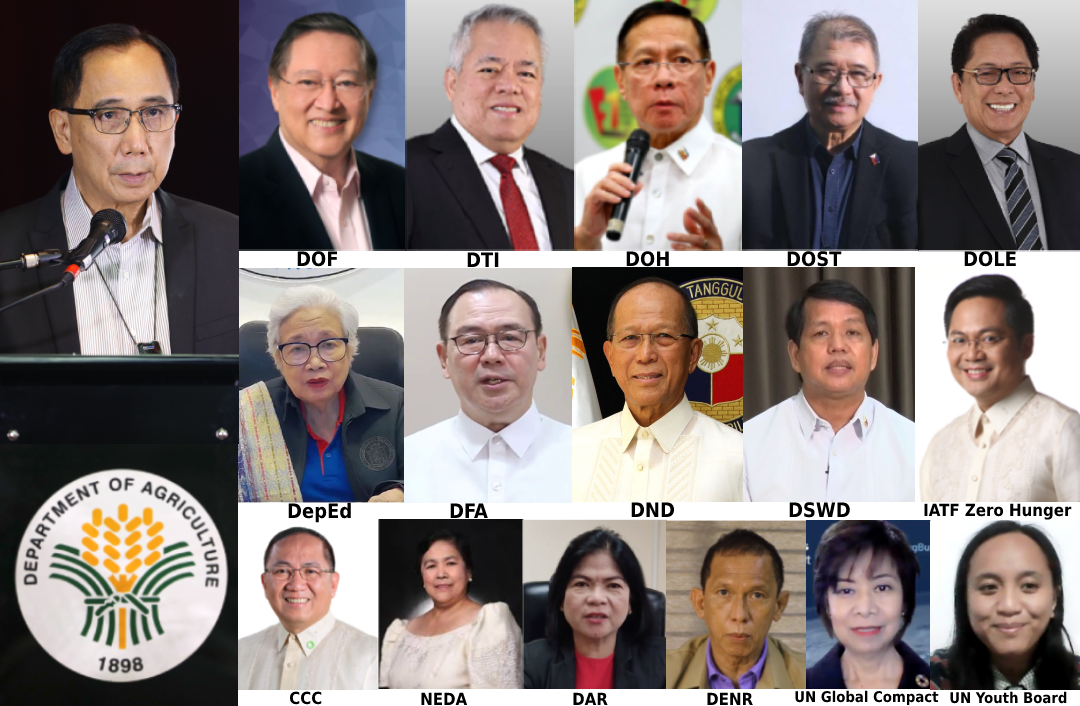
Agriculture and fishery industry stakeholders, top government officials, and heads of Philippine and United Nations (UN) developmental organizations support the call of the Department of Agriculture (DA), led by Secretary William Dar, for a unified and synergistic action to transform Philippine food systems and meet the UN sustainable development goals (SDGs) by 2030.
“It will take a whole-of-society approach to drive transformative change and build healthy, sustainable, technology-based and inclusive food systems in the Philippines,” said Secretary Dar, at the closing of the two-day Philippine national food systems dialogue, on July 14, 2021.
“Food system is not merely confined to production, but also covers a complex web of activities. This requires synergy among sectors to transform the country’s food systems to attain the SDGs nine years from now,” said the DA chief.
In the past two months, beginning March 2021, 18 independent dialogues led by the private sector, and 12 subnational dialogues by national government agencies, were conducted leading to the two-day national dialogues to consolidate the results.
Among the top government officials, who committed to support the DA’s initiatives to transform the country’s food systems, include department secretaries: Carlos Dominguez, of finance; Ramon Lopez, of trade and industry; Francisco Duque, of health; Fortunato de la Peña, of science and technology; Silvestre Bello III, of labor and employment; Leonor Briones, of education; Teodoro Locsin, Jr., of foreign affairs; Delfin Lorenzana, of national defense; Rolando Bautista, of social welfare and development; and cabinet secretary and chair of inter-agency task force on zero hunger Karlo Alexei Nograles.
Also giving their support are heads of Philippine and UN organizations, namely: executive director Emmanuel De Guzman, of the Climate Change Commission; undersecretary Mercedita Sombilla, of the National Economic Development Authority; undersecretary Emily Padilla, of agrarian reform; director William Cuñado, of DENR Environmental Management Bureau; Yayu Javier, of UN Global Compact Network Philippines; and Abigail Kitma, of UN Youth Advisory Board.
“The last two days have been a culmination of the process that the Philippines has undertaken in preparation for the UN Food Systems Summit (UNFSS) in September 2021,” said DA Assistant Secretary Agnes Catherine Miranda, who vice-chairs the Philippine NFSD steering committee.
“This will awaken the world with the fact that we all must work together to transform the way the world produces, consumes, and thinks about food. A solution summit that will require everyone to take action to transform the world’s food systems,” she added.
Part of the dialogue’s output is the DA’s draft statement on the Philippines’ pathways for the UNFSS, reiterating the country’s commitment to achieve SDG 1 (end poverty) and SDG 2 (zero hunger) by 2030. It also highlights the Duterte administration’s existing initiatives to eradicating food insecurity and empowerment of those engaged in various food systems activities.
For his part, Dr. David Nabarro, senior advisor to the UNFSS dialogues, congratulated Secretary Dar’s exemplary leadership and the “OneDA” family for conducting the series of dialogues that provide the basis for moving forward with the Philippines’ contribution to the summit.
“You’ve got the policies clearly laid out, but the challenge is always the implementation. That is why governance is critical in helping work this through,” he said.
“Whatever the governance that is used, it should be one that includes and welcomes all different stakeholders. So that when there’s commitment, there is also follow-through on the outputs to make sure that the process is fully implemented,” he added.
Dr. Nabarro also summarized the Philippine recommendations:
- Continue research and development (R&D) but adapt it to local conditions and realities;
- Adopt finance-based forecasting or early warning system to act early when there is a crisis;
- Institutionalize disaster risk reduction and management at all levels and establish climate information service; and
- Invest in sound infrastructure.
Finally, secretary Dar said: “The call of the times is to have food systems that are sustainable, equitable and resilient for us to feed our growing population, now and in the future. When our food systems fail, the resulting disorder threatens our health, education and economy, as well as peace and security.” ### (Rita dela Cruz, DA StratComms)














